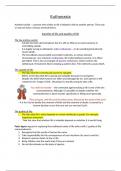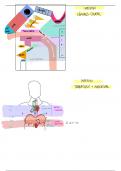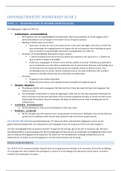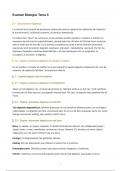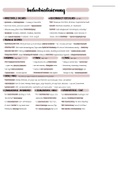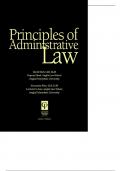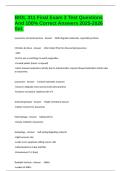Assisted suicide – a person who wishes to die is helped to die by another person. They may
or may not have a serious terminal illness.
Sanctity of life and quality of life
The law and key words:
- Suicide has been decriminalised, but it is still an offence to assist someone in
committing suicide.
- It is legally wrong to administer active euthanasia – to do something that directly
causes death.
- The tony Bland case provided a precedent whereby, in certain extreme
circumstances, non-voluntary euthanasia, life ended without consent, is in effect
permitted. This is also an example of passive euthanasia, which involves the
withdrawal of treatment that is keeping a patient alive. This indirectly causes death.
The sanctity of life:
- The idea that life is intrinsically sacred or valuable.
- Refers to the idea that life is special and valuable because it is God given.
- Despite the belief that humans are fallen and damaged by sin, each person is still
created in the ‘image of God’. Meaning it is morally wrong to take a life.
‘You shall not murder’ – the command against taking a life is one of the ten
commandments. Although it is possible to debate whether the
commandments is about murder specifically or killing more generally.
‘The Lord gave, and the Lord has taken away; blessed be the name of the Lord’
– it is for God to decide the moment of birth and the moment of death; it cannot be a
human decision as our lives are not our own but God’s.
The quality of life:
- The idea that life’s value depends on certain attributes or goods, for example,
happiness autonomy.
- Take the view that whether life is valuable depends on whether it is worth living.
Peter signer argues for replacing the traditional sanity of life ethics with 5 quality of life
commandments:
1. Recognise that the worth of human life varies.
2. Take responsibility for the consequences of your decisions (to save to end lie)
3. Respect a person desire to live or die.
4. Bring children into the world only if they are wanted.
5. Do not discriminate on the basis of species.
, Sanctity of life Quality of life
Religious view Secular view
Intrinsic value of life Instrumental view
Supported by natural law Supported by situation ethics and utilitarianism
Absolute Conditional
Autonomy and euthanasia
Autonomy:
Linked to the quality of life, and in direct opposition to the sanctity of life is the principle of
autonomy. This principle states that humans should be free to make decisions about their
own future.
It is a key feature of utilitarian thinking and can be tracked back to Mill’s non harm principle:
whilst the government or other authority may restrict our freedom if we are about to harm
someone else, they have no right to restrict our freedom about ourselves.
Acts and omissions
is there a distinction between medical intervention to end life and medical non-intervention
to end a life?
The Hippocratic Oath
The Greek philosopher Hippocrates states:
- That it would be wrong for a doctor to do something that would cause the death of
a person.
- He also suggests that it is pointless to continue to treat those who are overcome by
disease and for whom medicine is powerless.
It is this distinction that provides the background for the modern discussion of acts and
omissions. Roughly speaking an ‘act’ which causes death is morally (and legally) wrong but
an omission (stopping a treatment where the treatment is prolonging the inevitable death
and increasing the suffering of the patient) may not be morally wrong.
Rachels challenging acts and omissions
James Rachel has offered a thought experiment to suggest that the distinction between
actively killing and passively letting someone die may not be helpful.
- Suppose Smith will inherit a fortune if his young nephew dies.
One evening he drowns his nephew in the bath and arranges it to
look like an accident. The nephew’s death is an ‘act’ of Smith.
- Suppose Jones will also inherit a fortune if his young nephew dies. As he enters the
bathroom, he sees his nephew slip and this is head and slowly drowns. He watches
and does nothing to say the nephew. The nephew’s death is an ‘omission’, jones
could have saves him.
, Glover on ordinary and extraordinary means
Jonathan Glover suggests that the distinction between acts and omissions may not be so
clear cut. This is because our actions and our omissions may involve ordinary and
extraordinary means depending on whether the proposed treatment is something ordinary
such as food and water or whether it involves highly expensive medical technology which
would be an extraordinary means.
Glover says that there are five options regarding euthanasia:
1. Take all possible steps to preserve life.
2. Take all ordinary steps to preserve life but not use extraordinary means.
3. Not killing but taking no steps to preserve life.
4. An at which, while not intending to kill, has death as a possible foreseen
consequence.
5. The deliberate act of killing.
Peter signer also questions the distinction between acts and omissions. Using the Tony
bland case and questioned whether the removing of the feeding tube was an ‘act’ that led
to his death or an ‘omission’ i.e. they were now omitting to feed him.
Natural Law and euthanasia
Key points about Natural Law
1. Absolutist, Christian theory
2. Based on Aristotle’s “eudaimonia” and telos of humans – purpose and design; we
have a human nature
3. Aquinas: Four tiers of law: eternal, divine, natural, and human; natural law is the
moral thinking we can do (using reason)
4. Human should act in accordance with their nature and “do good and avoid evil”
(synderesis)
5. Primary precepts (from telos and synderesis) include preservation of life,
reproduction, education, ordered society, worship of God. Secondary precepts can
be deducted from this.
Natural Law and euthanasia:
Natural Law opposes euthanasia for a few reasons. However, in doing so it is important to
distinguish between allowing someone to die naturally, which the theory may support, and
cutting life short, which is always morally wrong.
Applying Natural Law:
The key precept of Natural Law argues for the preservation of life. Life is intrinsically
valuable and should not be shortened. Natural Law is dependent on the Divine Law revealed
by God. Key texts such as the Ten Commandments and Job 1:21 ‘God gives, and God takes


